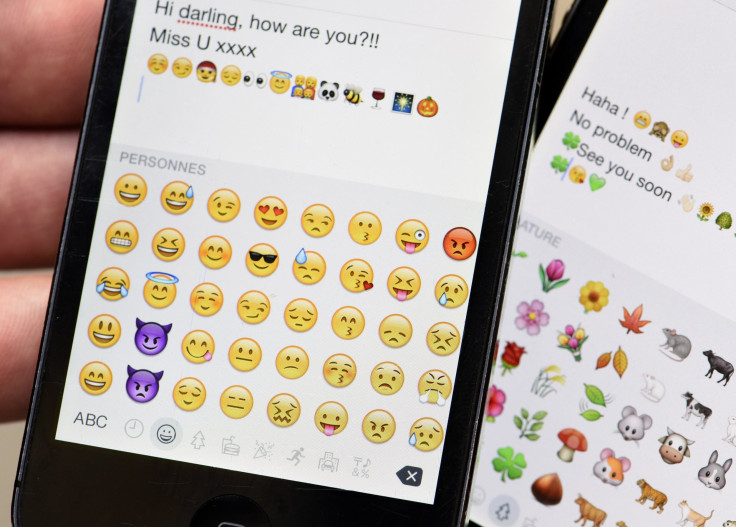New Emoji Bible Attempts To Make Christianity 'More Approachable' As Millennials Leave Church

It's a holy book, it's $2.99 and it might just save religion among young people.
"Bible Emoji: Scripture 4 Millennials" was released Sunday in the iBooks store. It's exactly what it sounds like: an adaptation of the King James Version of the Bible using internet slang and emoji, the adorable emoticons frequently used in text messages and tweets. Translated over the past six months by a person who identifies himself or herself only as the sunglasses-guy emoji, the objective of the emoji Bible is to make the text more appealing to people of various backgrounds and age groups.
"[Emoji are] language-agnostic — they allow you to convey an idea to anyone, regardless of what language they speak,” the creator told the Memo exclusively. “A major goal of this whole process was to take a book that I think is very non-approachable to lay readers and try to make it more approachable by removing a lot of its density."
The 3,282-page emoji Bible includes interpretations of all 66 books in the Bible and advertises itself as a "fun way to share the gospel." But it's already causing controversy, pointing to a larger challenge facing modern Christians: How do you engage millennials without being cheesy?
So the Emoji Bible is a real thing... I'm 😂 and 😭 at the same time pic.twitter.com/AR0k5fVX1p
— sammy🦋 (@srkalski) May 26, 2016
The millennial generation, which includes people between the ages of 18 and 34, is famous for bucking trends, and religion is no exception.
The percentage of adults who identify as Christians has been dropping steadily and quickly, going from about 78 percent in 2007 to 70 percent in 2014, according to data from the Pew Research Center. Only about half of the millennial generation says they definitely believe in God, compared to about 71 percent of the Silent Generation, those born from the mid-1920s to the early 1940s. About a quarter of millennials report attending religious services at least once a week.
Perhaps most alarmingly, a third say they're religiously unaffiliated — which, as Pew notes, is far more than the amount who say they're Catholics or Protestants.
"It's not as if young people today are being raised in a way completely different from Christianity," Pew researcher Greg Smith told CNN last year. "But as adults they are simply dropping that part of their identity."
Theories vary as to why this is happening — millennials distrust institutions, or they're getting married later, or they think the church is too antiquated — but the trend is a near-universal concern for Christians. So they're frantically searching for a remedy.
Case in point: Though the emoji Bible appears to be the first of its kind to be published, it's not the first to crop up on the internet. In 2014, artist Kamran Kastle launched a $25,000 Kickstarter campaign to make an emoticon Bible, according to the Inquisitr. It raised only $105.
When sunglasses-guy's "Bible Emoji" was announced, reactions were similarly mixed. The creator told the Huffington Post "abusive comments" from atheists and Christians alike led him or her to conceal his or her identity.
An emoji translated Bible- I weep for my generation.
— Ben Poe (@benjaminpoe) May 28, 2016
There's now an EMOJI format of the KJV bible.....And i thought i had seen it all....
— Chee_emekah (@Chee_emekah) May 29, 2016
Church leaders disagree on how exactly to cater to young people, which means it's unclear whether the newly released emoji Bible will end up helping or hurting their cause. The creator notes "Bible Emoji" has "no particular agenda," but several news articles and blog posts have pointed out that, as a generation, millennials have a low tolerance for pandering. “Millennials don’t like to be programmed to," Brian Coffey, a pastor in Illinois, told Exponential. "They can hear honesty. They have a radar for that.”
A Barna Group study from 2014 found that 67 percent of 18- to 29-year-olds wanted a "classic" church over a "trendy" one. That, of course, means different things to different people.
To Rachel Held Evans, a millennial Christian blogger, it means keeping up with the times without being fake about it. "What finally brought me back, after years of running away, wasn’t lattes or skinny jeans; it was the sacraments," she wrote in the Washington Post. "The sacraments are what make the church relevant, no matter the culture or era. They don’t need to be repackaged or rebranded; they just need to be practiced, offered and explained in the context of a loving, authentic and inclusive community."
To others — like the 6,500 people following @BibleEmoji on Twitter — it might mean the new emoticon-focused e-book.
"I think it's a fantastic idea to be presenting the Bible in new and creative ways," Caleb Woodbridge, who works for Scripture Union in England, told Premier Christian Radio. "We're all about reaching the next generation with the Good News, and anything that engages people in a fresh and exciting way seems a good idea to me."
Sometimes I wish the Bible had emoticons and emoji. Anyone else?
— Andy Wood (@andywood) March 10, 2016
This. Is. Totally. For. Real. The 📖 in 😊🤗❤️. Yes your day has been made and you are welcome. https://t.co/zli66Fpe3U @BibleEmoji
— Fairborn UMC (@FairbornUMC) May 26, 2016
© Copyright IBTimes 2024. All rights reserved.





















